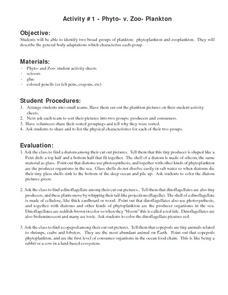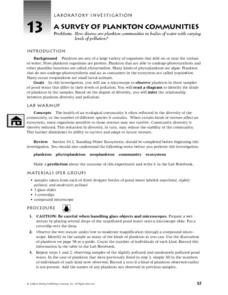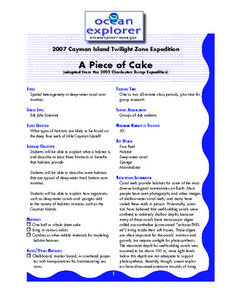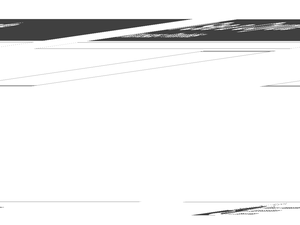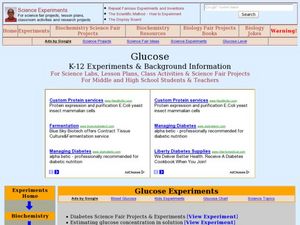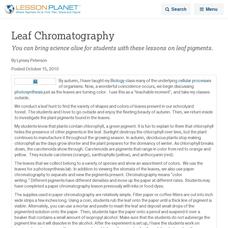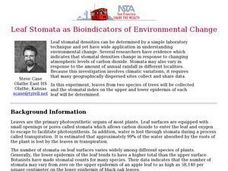Curated OER
Algae Part One: An Introduction
Students have the opportunity to view two types of algae under 400x magnification with a compound microscope. They make observations and record their observations through drawings and words. In addition, they identify different qualities...
Curated OER
Phyto- v. Zoo- Plankton
Students identify two broad groups of plankton: phytoplankton and zoo plankton. They describe the general body adaptations which characterize each group. They discuss and write about what it would be like to be carried around by the...
Curated OER
Plant Pigments
Students investigate the components of chlorophyll. They use paper chromatography to separate the many pigments of chlorophyll from one another.
Curated OER
A Survey of Plankton Communities
In this biology worksheet, students identify and define the vocabulary terms listed and make a prediction about the outcomes of the experiment. Then they complete the chart of the observations of the plankton diversity in drops of pond...
Curated OER
The Carbon Cycle
In this carbon cycle worksheet, learners will read about the carbon cycle and study a diagram showing what creates carbon dioxide and what uses carbon dioxide. Students will then complete 4 short answer questions.
Curated OER
The Euglena and Spirogyra
In this Euglena and Spirogyra instructional activity, learners read about these two Protozoans and they answer fourteen questions about their specified structures and functions. They color a diagram of Euglena and Spirogyra and label...
Curated OER
A Piece of Cake: Ocean Communities
Students explain habitats. In this model based lesson plan students create a model to help describe a habitat that is typical of deep-water. Students will describe how organisms such as coral and sponges add to their habitat.
Curated OER
Deep Gardens
Learners compare and contrast deep-sea coral reefs with shallow-water coral reefs. In this underwater ecology lesson, students describe three types of coral and explain why scientists are concerned about the future of deep-sea coral.
Curated OER
What's Down There
High schoolers write an essay about the coral reefs. In this oceanography instructional activity, students investigate the reef of Bonaire and compare it to reefs that are not thriving. High schoolers then explore the differences that...
Curated OER
How do living and non-living structures affect coral reef habitats?
Students create model coral reefs showing surface area and including examples of communities. In this coral reef lesson, students research and explore the functions or benefits from a coral reef. Students design a benthic...
Curated OER
I See a Coyote
Students role-play coyotes looking for natural resources. In this natural resources lesson plan, students examine the relationship between animal life and the environment. Students play a game that demonstrates how natural...
Curated OER
What Influences Reaction Rate?
Young scholars study reaction rates, what determines how fast a reaction happens and how the chemical changes occur. In this reactions lesson students complete a lab where they use Alka-Seltzer to observe reaction rate and create a...
Curated OER
Glucose
Students conduct various experiments on glucose. In this biology lesson plan, students differentiate the process of diffusion and osmosis. They test different foods for the presence of glucose and starch.
Curated OER
Leaf Chromatography
You can bring science alive for students with these lessons on leaf pigments.
Curated OER
Cells
In this biology learning exercise, learners use the clues given at the bottom of the sheet to complete the crossword puzzle on cells. There are 22 clues to solve in the puzzle on cells.
Curated OER
Leaf Stomata as Bioindicators of Environmental Change
Students, in this experiment, collect leaves from two species of trees and the stomatal index on the upper and lower epidermis of each leaf be determined.
Curated OER
Polar Bear Panic!
Students identify the three realms of the Arctic Ocean, and describe the relationships between these realms. They graphically analyze data on sea ice cover in the Arctic Ocean, and recognize a trend in these data.
Curated OER
Being Productive in the Arctic Ocean
Students identify the three realms of the Arctic Ocean, and describe the relationships between these realms. They identify major factors that limit primary productivity in the Arctic Ocean.
Curated OER
Forest Food Webs
Young scholars consider the interdependency of life in a temperate forest by studying selected organisms from an Asian temperate forest and creating a food web.
Curated OER
Life And Death
Learners participate in an interactive game to review how living things are classified.
Curated OER
Teaching about Data Interpretation
High schoolers explore a variety of relevant lake water chemistry questions, compose responses, and present their results in a poster format. They, in pairs, answer questions about lake chemistry which are imbedded in this plan.
Curated OER
Ocean Life
Students explore the topics of ocean water salinity, ocean life zones, marine life classification, and ocean food chains. They observe demonstrations, conduct experiments, complete quizzes and handouts, and analyze key vocabulary.
Curated OER
Leaf Stomata as Bioindicators of Environmental Change
Learners perform an experiment to determine the stomaltal index on the upper and lower epidermis of two species of leaves. Stomatal densities change in response to changing atmospheric levels of carbon dioxide and to annual rainfall.
Curated OER
Food Web Mobile
Students explain the main concepts of food webs and food chains. They
describe the role of animals, plants, and other organisms in cycling energy and matter through a food web by creating mobiles. Lesson contains adaptations for all levels.
Other popular searches
- Photosynthesis Worksheets
- Photosynthesis Crossword
- Photosynthesis & Respiration
- Photosynthesis Lab
- Photosynthesis Role Play
- Biology Lab Photosynthesis
- Photosynthesis in Plants
- Science Photosynthesis
- Photosynthesis / Respiration
- Plant Biology Photosynthesis
- Photosynthesis and Respiration
- Unit Photosynthesis



